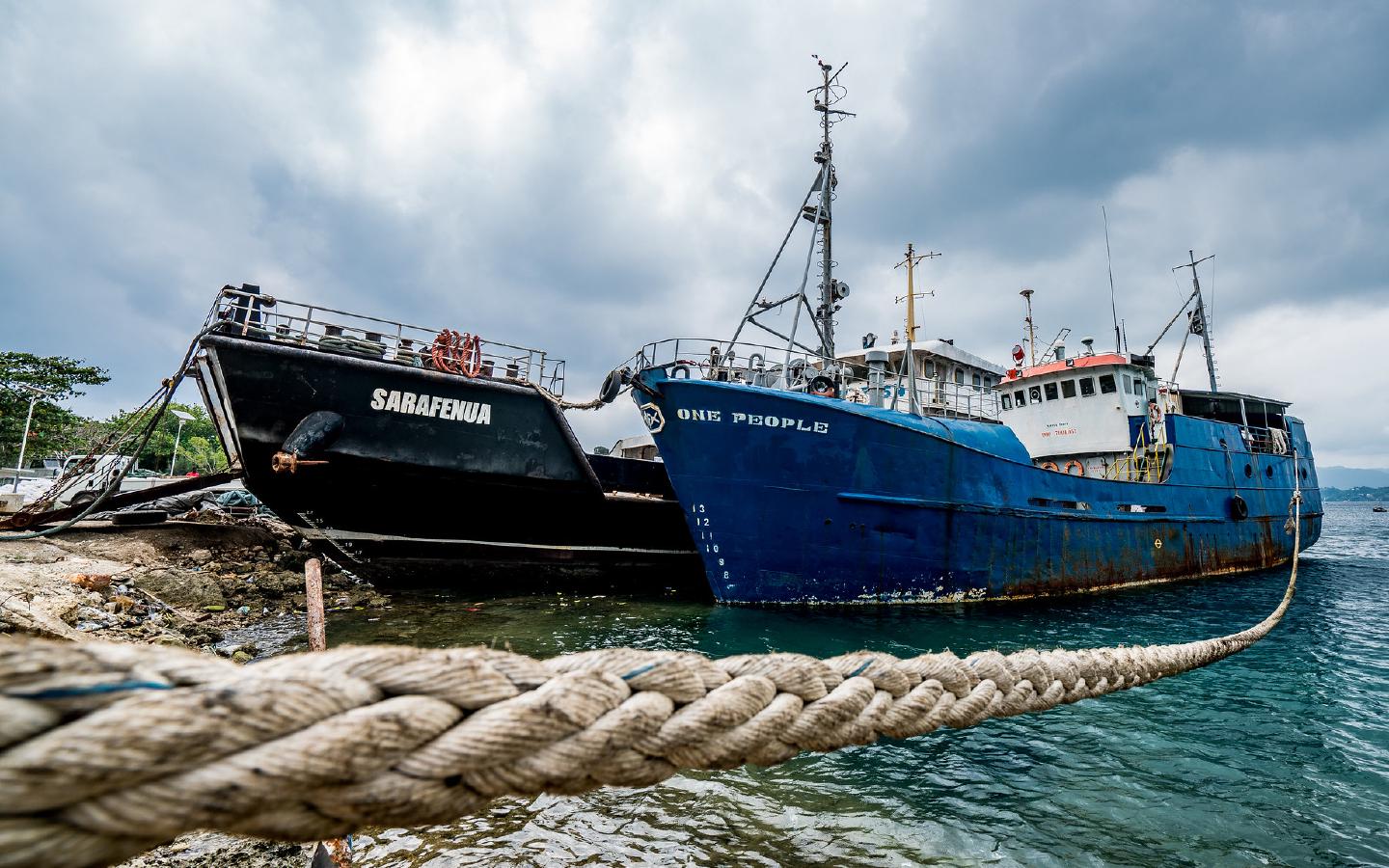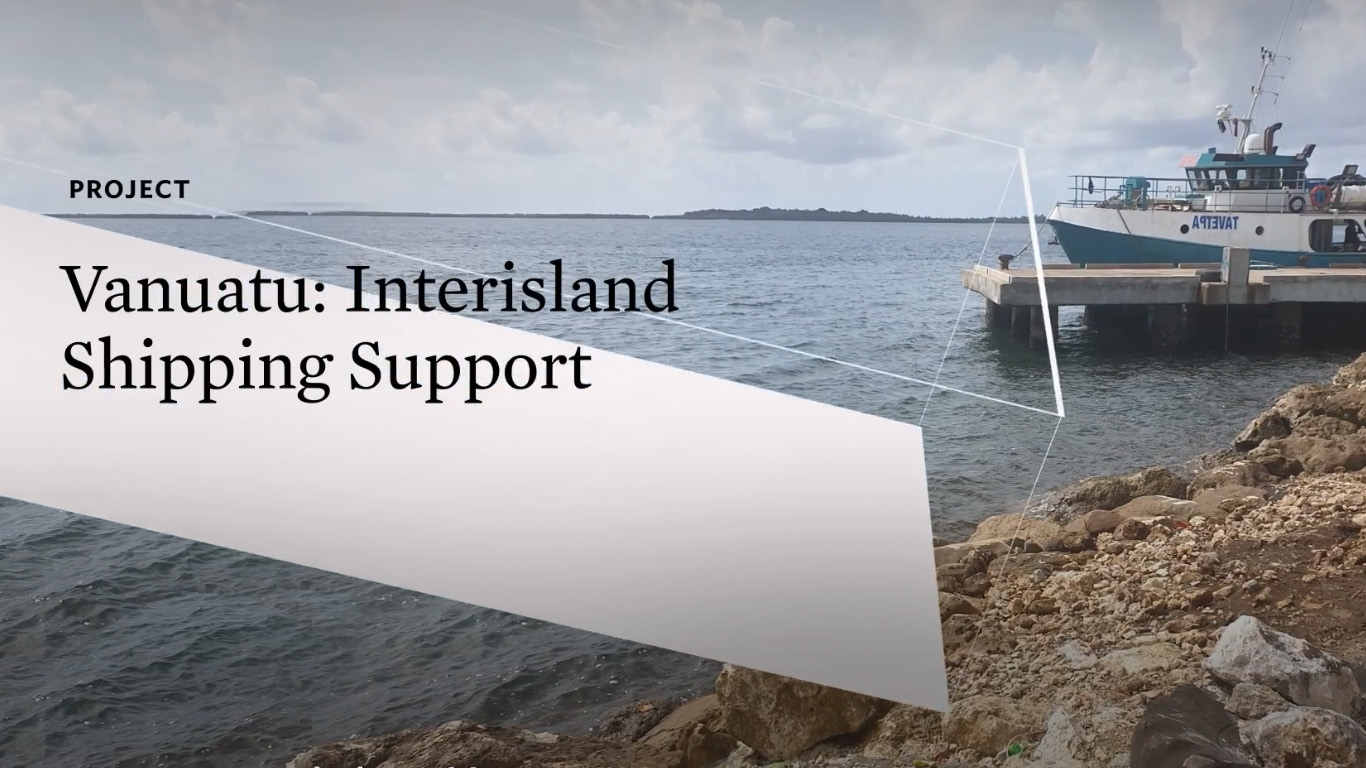ADB, New Zealand, and the Government of Vanuatu are improving and expanding maritime connections to bridge communities, bring services closer to the people, and support economic growth.
Water Transport
Vanuatu’s geography hinders access to basic services, jobs, and markets. For the 234,000 people scattered among 60 islands, water transport is critical. Without an efficient and effective interisland and international shipping sector, Vanuatu’s economy will drift, people will continue to miss opportunities to prosper, and communities will remain isolated. Geographic and transportation isolation also increases vulnerability to various disasters triggered by natural hazards, such as cyclones and earthquakes.
The country relies on two major public ports, Port Vila and Luganville, both badly needing repair. Most of the country’s public wharves and jetties are in poor condition, too.
Vanuatu’s interisland shipping is operated by private entities, most of which are owned by single ship owners with limited management and technical expertise in domestic shipping. On average, the ships are nearly 30 years old, with higher maintenance and operating costs. Many of these operators do not fully comply with safety protocols, nor do they gather data on passengers and cargo. In addition, shipping operations only run during favorable conditions. These issues deter economic growth and expose many people to maritime accidents.
Revamping the Shipping Industry
Since 2011, ADB and New Zealand have been helping Vanuatu improve its maritime transport sector. They initiated the Interisland Shipping Support Project, which focuses on both infrastructure and improving water transport services and capacities so that shipping is safe, effective, efficient, and able to reach remote areas.
The project is constructing a new interisland shipping terminal in Port Vila, one of the country’s major ports. It will expand the port’s berthing capacity to accommodate a bigger mix and number of vessels and crafts. It rehabilitated two more jetties in remote areas. These facilities have inclusive designs that accommodate women, children, and people with disabilities, and integrate climate and disaster considerations.
The project also helped establish shipping schemes that encourage private operators to adhere to a fixed number of voyages with an agreed-upon frequency. It provided operators with subsidies based on performance, vessel suitability, areas and routes, voyage locations, and frequency. Under the new setup, over 190 voyages have been completed as of April 2024, reaching the remote areas of the country. It also recorded over 3,000 passengers from 2020 to the first quarter of 2024. It has identified five shipping routes, further expanding the country’s shipping network and reach. Appreciating the benefits associated with the subsidized shipping scheme, the government is continuing the scheme with reduced subsidies.
To bolster shipping safety, the project helped establish the Office of the Maritime Regulator (OMR), an independent agency to oversee Vanuatu’s maritime sector. It also supported the drafting and enactment of Vanuatu’s Maritime Sector Regulatory Act of 2016, which provides a conducive policy climate for the shipping industry. The OMR started its operation in July 2017 and later evolved into the Vanuatu Maritime Safety Authority. In parallel, ADB built the institutional capacity of the Ministry of Infrastructure and Public Utilities, which includes the crafting of two critical plans—the Ports Development and Management Plan 2040 and the ongoing Transport Sector Roadmap and Investment Plan.
Connecting Islands, Markets, and People
Although there have been some implementation delays at the beginning of the project and due to the COVID-19 pandemic and the lockdowns that ensued, the project has been building momentum to connect Vanuatu’s people to basic services, markets, and a brighter future. The government has already addressed and managed other implementation snags in procurement, budget, and in design. The main domestic wharf at Port Villa is all set to complete its construction and start operations by early next year.
“Vanuatu’s future opportunities and growth are hindered not only by its regional isolation but also by its own internal geographic and infrastructure barriers. Interisland maritime services will connect Vanuatu’s people better to education, health, markets, jobs, and government services. It will also boost the tourism industry, enabling Vanuatu to recover faster from the recent economic shocks,” said project officer Hussain Haider. “ADB is proud to join New Zealand and other partners in helping Vanuatu rebuild its port and jetty facilities and overhaul its shipping sector.”
This project demonstrates how focusing on a critical aspect of a country’s growth, such as the transport sector, can help achieve long-term growth. It also showcases the commitment and dedication of the project partners. ADB continues to support Vanuatu through financing partnerships such as this, and also through the Asian Development Fund which finances grant operations in ADB’s poorest and most vulnerable developing member countries. It is now helping the government prepare the next phase of this project.
"Interisland maritime services will better connect Vanuatu’s people to education, health, markets, jobs, and government services. It will also boost the tourism industry, enabling Vanuatu to recover faster from the recent economic shocks."
~ Syed Hussain Haider, ADB principal transport specialist
Share


